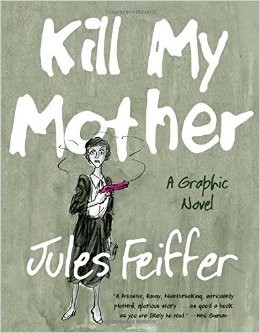Jules Ralph Feiffer (born January 26, 1929) is an American cartoonist and author, who was considered the most widely read satirist in the country. He won the Pulitzer Prize in 1986 as North-America's leading editorial cartoonist, and in 2004, he was inducted into the Comic Book Hall of Fame. He wrote the animated short Munro, which won an Academy Award for Best Animated Short Film in 1961. The Library of Congress has recognized his "remarkable legacy", from 1946 to the present, as a cartoonist, playwright, screenwriter, adult and children's book author, illustrator, and art instructor.When Feiffer was 17 (in the mid-1940s) he became assistant to cartoonist Will Eisner. There he helped Eisner write and illustrate his comic strips, including The Spirit. He then became a staff cartoonist at The Village Voice beginning in 1956, where he produced the weekly comic strip titled Feiffer until 1997. His cartoons became nationally syndicated in 1959 and then appeared regularly in publications including the Los Angeles Times, the London Observer, The New Yorker, Playboy, Esquire, and The Nation. In 1997, he created the first op-ed page comic strip for the New York Times, which ran monthly until 2000. He has written more than 35 …
Jules Feiffer
Author details
- Born:
- Jan. 26, 1929
External links
Jules Ralph Feiffer (born January 26, 1929) is an American cartoonist and author, who was considered the most widely read satirist in the country. He won the Pulitzer Prize in 1986 as North-America's leading editorial cartoonist, and in 2004, he was inducted into the Comic Book Hall of Fame. He wrote the animated short Munro, which won an Academy Award for Best Animated Short Film in 1961. The Library of Congress has recognized his "remarkable legacy", from 1946 to the present, as a cartoonist, playwright, screenwriter, adult and children's book author, illustrator, and art instructor.When Feiffer was 17 (in the mid-1940s) he became assistant to cartoonist Will Eisner. There he helped Eisner write and illustrate his comic strips, including The Spirit. He then became a staff cartoonist at The Village Voice beginning in 1956, where he produced the weekly comic strip titled Feiffer until 1997. His cartoons became nationally syndicated in 1959 and then appeared regularly in publications including the Los Angeles Times, the London Observer, The New Yorker, Playboy, Esquire, and The Nation. In 1997, he created the first op-ed page comic strip for the New York Times, which ran monthly until 2000. He has written more than 35 books, plays and screenplays. His first of many collections of satirical cartoons, Sick, Sick, Sick, was published in 1958, and his first novel, Harry, the Rat With Women, in 1963. He wrote The Great Comic Book Heroes in 1965: the first history of the comic-book superheroes of the late 1930s and early 1940s and a tribute to their creators. In 1979, Feiffer created his first graphic novel, Tantrum. By 1993, he began writing and illustrating books aimed at young readers, with several of them winning awards. Feiffer began writing for the theater and film in 1961, with plays including Little Murders (1967), Feiffer's People (1969), and Knock Knock (1976). He wrote the screenplay for Carnal Knowledge (1971), directed by Mike Nichols, and Popeye (1980), directed by Robert Altman. Besides writing, he is currently an instructor with the MFA program at Stony Brook Southampton.
